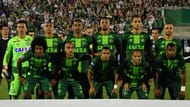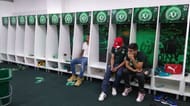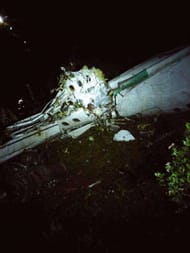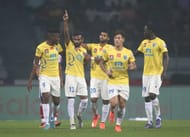When I woke up yesterday, I didn't know who Associacao Chapecoense de Futbol were.
I had heard they were in the finals of the Copa Sudamericana – these things always come under the scanner of a football journalist - but that's about it.
I didn't know them.
I do now.
I know that they play in the deep green that evokes the grandeur of the Amazon.
I know that they were a grand fairytale story in the making - an unheralded team from a little-known city called Chapecó in the state of Santa Catarina, deep in the South of Brazil, that had made it big. A team that was founded only in 1973, and had meandered along the vast maze that is the regional Brazilian football set up for ages before bursting through. They had won the Campeonato Catarinense within five years of its founding, and they would go on to win it 4 more times –the last three of which happened in the last decade.
I know that they had had to suffer the ignominy of failing to qualify for the fourth division of Brazilian professional football in 2008 – the Serie D – and that after that they went on an ascent that captured the hearts and minds of a nation that had long been suffering from a rut in the game that they so very much love. They had qualified to the Série D the next year and finished third. They had qualified to the Série C where they finished seventh, fifth and then third in consecutive years. In their first season in Série B, they had finished an incredible second. Playing alongside the truly big boys of South American football Série A, they had finished 15th and 14th in the past two years, and were 9th this year, with just one game of 2016 remaining.
I know that they had gone on a run in Copa Sudamericana that no one in their right minds had anticipated – a run that had put them in their first continental final ever.
In real life, fairy tales do not happen as they do in the books and stories that we are brought up on. They do not happen because they are 'destined' to do so, or because there is a fairy godmother looking after us. They happen because, a person, or as in this case a bunch of persons - a brotherhood - decide that they will do everything in their power to do the best they can.
And that's how Chapecoense did it.
They didn't believe it was some God-given right of theirs to lay claim to some trophy, they didn't bank on success coming to them, they went out there and fought for it with bunch of unfancied players – the most well-known of whom is probably Cléber Santana – formerly of Atlético Madrid and Real Mallorca.
I know the incredible odds they were up against, and they hadn't really done it with any kind of cinematic flourish. They had gone up against mighty Independiente of Argentina in the round-of-16 and scraped through on penalties having played out two goalless draws. They saw off another Argentine giant San Lorenzo only on away goals, having drawn 1-1 at the Estadio Pedro Bidegain. You want another fact that epitomises just how unfancied a team Chapecoense are? The return leg of their Copa Sudamericana final with Atlético Nacional (of Medellin, Colombia) was set to be played 480 km away from Chapeco, in the city of Curitiba – because Arena Condá, their home stadium, just wasn't big enough to meet CONMEBOL regulations.
I know they played 4-2-3-1 generally, Danilo in goal, Neto, and Thiago forming a solid centre-back partnership, Caramelo and Dener bombing up down the flanks in the traditional style of Brazilian fullbacks. Josimar and Gil sitting back and controlled the tempo of the game (offensively and defensively), Cleber Santana – their captain and talisman – creating chances like a traditional trequartista of yore, Thiaguinho and Ananias creating havoc on the wings and Everton Kempes playing the role of lone forward to perfection.
I know that the coach Caio Junior was a master tactician who created an indefatigable esprit-de-corps that had led them on their magical South American expedition and believed in himself, and his team. And who won matches against bigger, wealthier teams filled with more skilled, stronger players by virtue of the discipline he had instilled in the team.
“Our team really reminds me of Leicester, a team from an unfancied city that was able to win an important title,” he said after a league win over Fluminense. “I want to make a mark this season with this club, this group of players.”
I know that their little town loved them
"They played for the love of the shirt and not for the money," fan Jean Panegalli, 17, told Reuters in Chapeco. "They played with the commitment that only those who have lived here know.”
They really did create magic.
I now know the club too.
I know that Thiaguinho (Thiago Viera), a budding 22-year-old striker, had found out he was going to be a father for the first time just a week before the crash. I know that Matheus Soli, Caio Junior's son, wasn't on the flight just because he had forgotten his passport at home. I know that Marcos Danilo, their 31-year-old goalkeeper, had been pulled out alive and had reportedly talked to his wife before succumbing to his injuries... F***...
I haven't ever seen a match of theirs live, and I can't get my words to follow each other in a coherent order. I can't imagine how this must feel for those close to the players, and worst of all for those who survived.
There is a photo doing the rounds that has been haunting me ever since I saw it. It's the photo of three players sat in the dressing room as the empty booths of their colleagues envelop the frame with a sense of unmitigated tragedy. The looks on their faces, their body language reflecting their frame-of-mind and highlighting their emotions - survivors guilt, grief at the loss of their brothers, incomprehensible melancholy – emotions that are too deep to be described with any semblance of accuracy.
A photo speaks a thousand words? This one does the work of a million.
Central defenders Hélio Hermito Zampier Neto and Alan Ruschel along with goalkeeper reserve goalkeeper Jakson Follmann were the only members of the squad to survive the crash. All three have grievous injuries, Ruschel has had surgery on his spine, Neto is in intensive care with severe trauma to his skull, thorax, and lungs, while Follmann had to have his right leg amputated. Their wounds – so deeply shocking for us, will probably seem so incredibly minor to them.
Rafael Valmorbida of Radio Oeste Capital is the only one of twenty journalists to have survived the crash. Air hostess Ximena Suarez is the only one of nine crew members who survived.
Eighty-one human beings took the flight, only five survived. It doesn’t matter who was involved; this was a tragedy. Period.
Footballers and football teams from across the planet have come together in an unprecedented sign of solidarity. Brazilian clubs have pledged to loan players free of cost for the 2017 season and they have even appealed to the Brazilian FA asking that Chapecoense not be relegated for the next three years. The Argentine Federation has promised players, Palmeiras (champions of Brazil) have requested that they play their last game of the season in the beautiful green of Chapocoense. Football associations, clubs, players and football fans all around the world have sent in their love and prayers.
Lucas Leiva asked Jurgen Klopp if he could wear a black armband to honour his friends who had passed away, the enigmatic manager told him that the entire team will be wearing it. CK Vineeth refused to celebrate his goal for Kerala Blasters against Atletico de Kolkata.
Atlético Nacional have already asked CONMEBOL to have the Copa Sudamericana to be awarded to the Brazilian team. It is at the time of great tragedy that men are moved to do genuinely good things.
Beautiful gestures all, but nothing will assuage the sorrow that permeates through Chapeco – not for a long while.
"They never tired of climbing and now they're in heaven" read a hand made sign placed on an improvised shrine outside the players entrance to the stadium.
I can quote poems or great sayings, and advocate that the families of the departed, and the survivors, gain strength from this great tragedy. It would be the right way to end this eulogy – but I cannot bring myself to do it.
I will move on soon enough. As will you.
They, the people of Chapeco, the players who survived or didn't take the flight, the families of the journalists and the crew members... they won't.
Not now, maybe not ever. Their lives will be moulded by this, shaped by this grand flow of sadness that will define the way we look at them, and they look at the world. Like how it did for Manchester United after Munich and Torino after the Superga disaster.
I pray for the souls of the departed, and the broken hearts of the survivors. Football wounded them, but football can also heal them. I pray that the people of Chapeco, and indeed everyone affected in any shape, form or manner by the events of yesterday, find solace in our beautiful game – as millions around the world do every day.
I pray that Chapecoense find it within themselves a great, deep, well of strength that will enable them to rise up once again and wow the footballing world.
I know that this time, I will be watching.
ForcaChape. You will never be forgotten.




